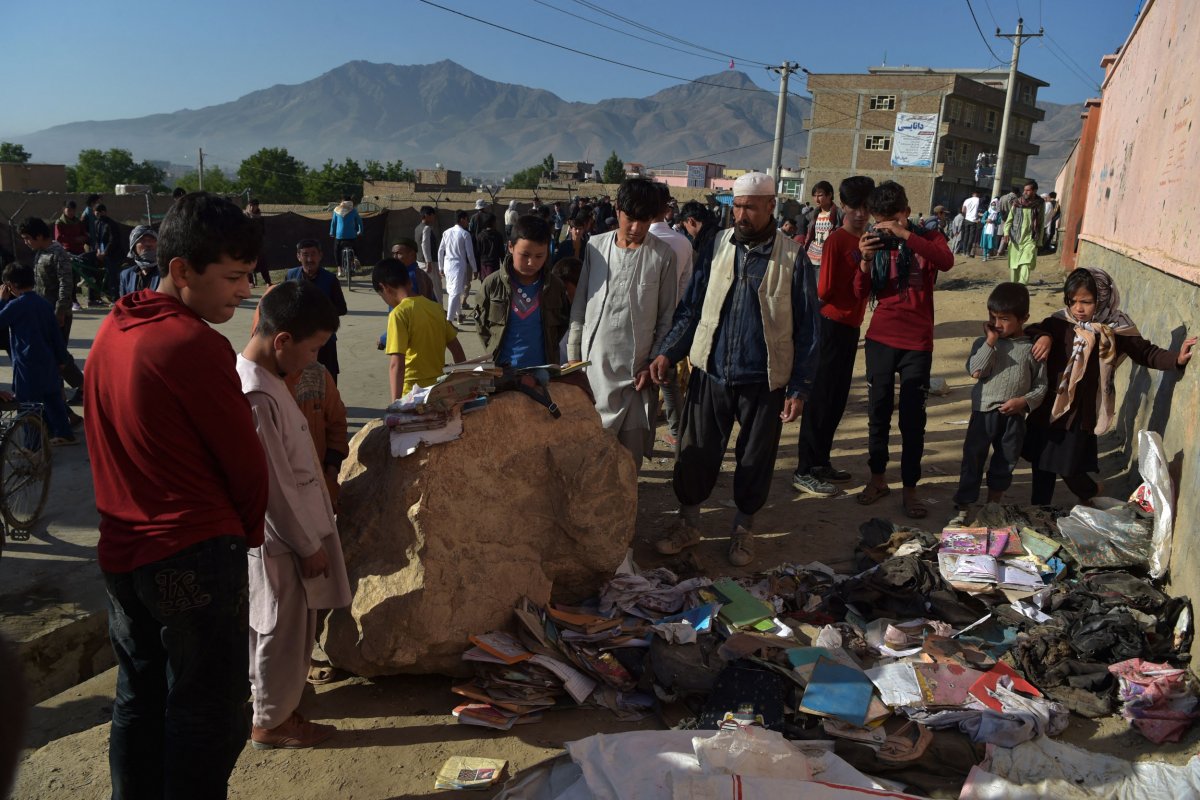The Taliban has denied involvement in a bombing at a girls' school in Kabul that killed at least 50 people over the weekend, but an expert on human rights and the rule of law in Afghanistan told Newsweek their denials don't really matter.
"They can deny it as much as they want, but the reality is that the entire country believes that it's the Taliban who are behind these attacks," said Belquis Ahmadi, a senior program officer at the United States Institute of Peace.
"These are just empty words—just useless, baseless denials. The truth is that they have hands in all of these attacks one way or another," Ahmadi said.
The May 8 bombing is one of several attacks reported in recent days as U.S. troops began withdrawing from Afghanistan. Three blasts went off during the attack near the entrance to the school, which is located in a largely Shiite Muslim area, as students were leaving for the day, according to the Associated Press. While male students occupy the campus during the morning hours, female students take classes in the afternoons, the AP reported. The female students were the ones who were present at the time of the bombing.
Though the Taliban has denied having a role in the bombing, a spokesperson for Afghanistan's Ministry of Interior Affairs attributed the attack to them in a series of tweets posted over the weekend.

At least 50 people have died—several of whom were young students between the ages of 11 and 15—and more than 100 others were injured in the bombing, according to the AP.
Ahmadi told Newsweek her conversations with people on the ground in Afghanistan indicate the death toll and number of people wounded in the blasts are likely much higher than official reporting indicates. Most of the families impacted by the bombing live below the poverty line, Ahmadi added.
The uptick in violence comes amid rising concerns for women in Afghanistan, many of whom recall suffering under the Taliban's earlier rule in the 1990s and fear their anticipated return.
U.S. troops have remained in the region since the attacks of September 11, 2001 drove the U.S. to establish a presence in Afghanistan, but are expected to be gone by its 20th anniversary this fall. Though Roya Rahmani, Afghanistan's ambassador to the U.S., recently told Newsweek the U.S.' decision to leave Afghanistan was an expected development, the move has been criticized by human rights experts who worry about the impact a departing U.S. and returning Taliban will have on women.
Former President Donald Trump reached an agreement with the Taliban last year to withdraw U.S. and allied forces by May 1. The Afghan government was not involved in the discussions that led to the agreement, nor did the agreement include specific requirements for the Taliban to meet in order for the troop withdrawal to proceed. The latter is a point of particular concern to experts like Ahmadi.
President Joe Biden announced last month that the troop withdrawal would indeed occur, though on a slightly delayed timeline. Troops began leaving the region on May 1 and are expected to complete their withdrawal by September.
Ahmadi told Newsweek the U.S. still has "a lot of leverage" with the Taliban, which she said can be used to secure a safer future for women in Afghanistan. That leverage includes placing sanctions on individual Taliban members and putting pressure on Pakistan to encourage the Taliban to negotiate with the Afghan government as both parties decide on a path forward for the country's future.
Without specific agreements from the Taliban to protect women and minority groups in Afghanistan, Ahmadi said attacks like the one at the school in Kabul are likely to continue.
"If such attacks continue, especially on the religious minorities like Shiites, that further provokes the illegal armed groups and other communities to beef up their activities," Ahmadi said. "That's going to lead to another level of violence and conflict in Afghanistan."
Uncommon Knowledge
Newsweek is committed to challenging conventional wisdom and finding connections in the search for common ground.
Newsweek is committed to challenging conventional wisdom and finding connections in the search for common ground.
About the writer
Meghan Roos is a Newsweek reporter based in Southern California. Her focus is reporting on breaking news for Newsweek's Live ... Read more
To read how Newsweek uses AI as a newsroom tool, Click here.








